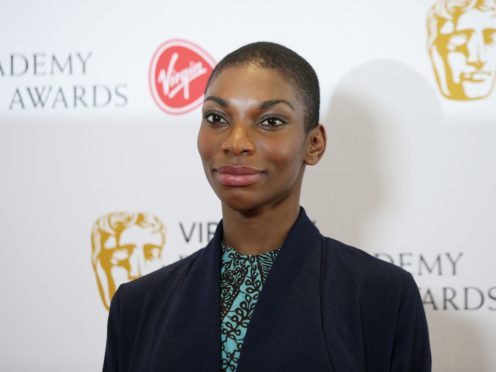Actress Michaela Coel has claimed she was sexually assaulted by strangers, but said that writing about it for a new TV show has been “therapeutic”.
Coel, who wrote and starred in Bafta-winning E4 comedy series Chewing Gum, told the Edinburgh TV Festival of the “life-changing” experience, but did not say when, or where, it happened.
The star, who is also a playwright and poet, delivered the James MacTaggart Memorial Lecture, the keynote speech of the festival which has been its centrepiece for more than 40 years.
The youngest and first person of a black or ethnic minority background to deliver the MacTaggart Lecture @MichaelaCoel has taken to the stage
— EdinburghTVFestival (@EdinburghTVFest) August 22, 2018
She was only the fifth woman to ever deliver the speech, and at age 30 she was the youngest. She was also the first from a black, Asian or minority ethnic background to give the lecture.
Coel said that she was not raped within the offices of the company she was working for at the time, and that she has “never been raped by anyone” at that company.
Coel said she was working overnight in the company’s offices, and that she had work due at 7am.
She said: “I took a break and had a drink with a good friend who was nearby.”
But she later “emerged into consciousness” in the middle of typing up her work, “many hours later”.
“I was lucky,” she said. “I had a flashback. It turned out I’d been sexually assaulted by strangers.
“The first people I called after the police, before my own family, were the producers.”
Coel said: “How do we operate in this family of television when there is an emergency? Overnight I saw them morph into a team of employers and employees alike; teetering back and forth between the line of knowing what normal human empathy is and not knowing what empathy is at all.”
She added: “When there are police involved, and footage, of people carrying your sleeping writer into dangerous places, when cuts are found, when there’s blood… what is your job?”
Coel said that she had a “mind overcrowded by flashbacks”, and was struggling to complete her work.
She said she was “not sure how damaging it would be to the company” to ask to push back her deadline.
She said: “I was lucky, someone was transparent with me: ‘They won’t offer you the break,’ a colleague said, ‘that’s not the way it is, you have to take it.’”
She asked for the deadline to be pushed back and for her employers to be “informed as to why”, and that her request was met.
Coel said that the company she worked with sent her to a private clinic, “a service they offer to staff when in need”, and that they also funded her therapy.
“Like any other experience I’ve found traumatic, it’s been therapeutic to write about it, and actively twist a narrative of pain into one of hope, and even humour,” Coel added.
“And be able to share it with you, as part of a fictional drama on television, because I think transparency helps.”
Responding to Coel’s lecture, Channel 4’s director of programmes Ian Katz said: “Michaela’s MacTaggart is a powerful and important wake-up call. She has raised vital questions about opportunity, support, transparency and inclusion that as an industry we must all address with urgency.
“The experiences she has described in her lecture are not what we would want for anyone working with Channel 4 or any part of our industry.
“She has opened an honest debate about how we ensure that writers and performers, whatever their backgrounds, feel respected and heard.
“We want an industry that truly celebrates difference and is accessible to all, so broadcasters and producers now need to work in partnership to act on the issues she has raised.”
Coel’s speech came hours after the BBC confirmed that she will write and star in a new drama that will explore the issue of sexual consent.
The series, which has a working title of Jan 22nd, is set to look into the distinction between liberation and exploitation.
Coel will play Arabella, whose raw and personal experience of consent sits at the heart of the story.
Through her audiences she will meet a group of fictional friends and colleagues whose sexual adventures frequently collide with a world in which new codes of sexual practice are emerging.
Coel has appeared in Channel 4 drama Top Boy, and had leading roles at the National Theatre. She will next appear in mini-series Black Earth Rising, opposite John Goodman.
